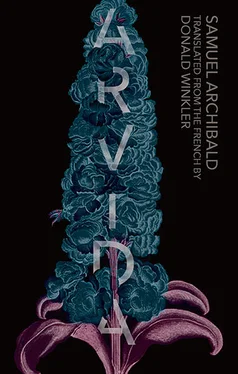The girls sulked a little, then ate in silence.
The girls loved going to work on foot because they had to cross what they called the fields of the Lord up to Concession Road 3, and Monsieur Béliveau’s fields as far as the gravel road serving the residents of Lac Brochet, and follow the road for a hundred metres before turning right onto the dirt road that had belonged to the hydroelectric company and wound its way through the hills up to the cadet camp. It took almost an hour every morning but they loved doing it together at dawn. Their grandfather had been a guard at the hydroelectric company’s installation. He’d spent half his life tramping these roads and the girls felt that the road was theirs and that the whole world belonged to them when they walked on it. It was an ancient world where an old broken-down shelter became a castle’s ruins. An imaginary world they peopled with creatures they didn’t believe in but that they’d believed in for long enough that the bushes and crevices along the way remained forever their lairs. They imagined imps and fairies, dragons and werewolves; they imagined enormous creatures that were half fish and half reptile and that swam in the brackish current of the little stream, and the girls even contrived to see them forcing their way through the water’s surface with powerful strokes of their fins.
There was also a real cowboy.
The handsome Monsieur Robertson sometimes rode one of his horses along the road at dawn and they played a game with him. Always the same. It was a game that never changed. A ritual. They whistled at Monsieur Robertson every time they met or passed him along the road and they said “Howdy, cowboy,” assuming the provocative poses of saloon molls while he greeted them by pinching the brim of his hat and saying, “Med’moiselles.” He didn’t look like their father who was short in stature, both sturdy and portly.
He was tall and gnarled but his face betrayed the same mix of gentleness and strength as did that of their father, something they didn’t find in most of the men their father resembled.
This was their path through a world that belonged to them only and they hated it when a car passed by or when their father drove them because as far as they were concerned fairies could perfectly well rub shoulders with cowboys but not with Cadillacs, and for them such machines were huge metal blots on the landscape. But Billy had come back and their father didn’t want them wandering around out in the open so he’d decided that they would spend this morning on a dreary road behind the windows of a pick-up truck that like a dull blade strips the world of all its mystery and magic.
*
One Sunday a long time ago their father had come to pick them up in his truck and said to them:
“Get in, my babies.”
Lucie was fourteen and she was twelve. They didn’t like being seen in public with their parents any more, but the Sunday excursions still held sway to some extent. They often amounted to a simple tour of the fields of the Lord and the village streets, but sometimes they turned into something else. When they were little that’s how their trips began. Their father loaded up the baggage in secret and came to fetch them in the car with their mother and they drove all four together or all five once Angèle was born or all six once Frédérique was born or all seven once Corinne was born, and their mother turned to them with, in the palm of her hand, two doses of Gravol, one for each of them, and they woke up somewhere else. In the house of strangers or on roads they didn’t know.
Once their father had asked them:
“Would you like to see the ocean, my babies?”
And he had led them through valleys and across mountains to the great river where they had boarded a boat and seen lazy whales like big boulders just peeking out of the water.
Once their father had asked them:
“Would you like to fly in the sky, my babies?”
And they had driven to a nearby airfield and their father had taken them for a ride in a Cessna with a pilot friend. They had flown over their house on the fields of the Lord, and flown farther over fields and houses and lakes and kilometres of forest. The girls had the feeling that the world was much bigger than they would have believed but also smaller because they could with one bent index figure encircle whole villages. From the sky the world was like a miniature model but when they arrived face on to the brilliant sun over the limitless Lac Saint-Jean, the little girls, blinded, lost all notion of geography, and they believed like the pagans that there existed nothing beyond the lake and that they had come to the end of something.
That Sunday their father had asked, once they were both settled in the back seat:
“Do you want to see a bear, my babies?”
The girls had already seen horses and cows and hares and frogs and all sorts of animals including the eagle owl that had amused itself for months opening the skulls of their mother’s cats to peck away at the insides of their heads, consuming the contents like a sorbet. The girls had always had cats and dogs and they had seen hundreds of insects and had extricated from the muddy edges of the trout pond black and yellow salamanders they kept in a tortoise aquarium and they had even seen a fox once at the back of a blueberry field and a moose on the cadet camp road, but the only bears they had seen were in their imaginations.
Their father took them with him in the autumn to put up electric fences around the beehives. The odour of honey attracted bears and you had to protect the hives from their attacks. It was just a precaution because there were not many bears around but the girls liked to believe in danger and their father let them do so. They imagined the silhouettes of mammoths writhing and roaring at the edge of the forest with red eyes and frothy mouths and big yellow fangs. Those monsters were all they knew of bears.
Their father led them to an old farmhouse behind which there was no longer a farm but just a big shed and an old lopsided barn and the carcass of an ancient tractor. Behind the shed there was a cage as big as the shed itself. It was two metres high and its rectangular surface was fifteen metres by ten. The wooden structure was made from big square-ended beams. Six of them were planted like pickets; four marked out the limits of the structure and two reinforced it at the mid-points of the longer sides. Other beams were installed horizontally to form a frame at the end and in the middle of each support. Between the beams there was metal mesh as in a chicken coop but with wider openings, and steel strands that were much thicker. In the cage was a large mound of black fur glinting blue that was pacing to and fro and sniffing the ground. From a distance you might have thought it was a dog but the animal was bigger and it smelled stronger and its eyes were both gentler and wilder and its muzzle looked made out of wood. A man came out of the house. He shook their father’s hand and kissed both girls on their cheeks and ushered them into the cage where they could pet the chained-up bear. Its fur was thicker and stiffer than that of a dog and underneath its body seemed warmer. The old gentleman stayed next to the bear while they were touching it and stroking its neck and said in its ear that it was a good bear and a good animal and talked to it just like you talk to a horse or a dog.
*
On the way home their father told them that the old man’s name was Monsieur Roberge. He’d been a friend of their grandfather and had become his own friend when he’d hired him to help build his house. Monsieur Roberge had been an avid hunter all his life and deep down he still was even though he hadn’t hunted for years. You call an avid hunter like Monsieur Roberge a Nemrod, which was the name of a great hunter in the Bible. It was hard to understand for little girls like them, but people who kill animals often love animals dearly, and it’s hard to grasp but a Nemrod like Monsieur Roberge had to his credit only a limited number of kills. Never mind his skill in tracking and flushing out and trapping game, one day a Nemrod could no longer muster the strength to kill it.
Читать дальше












